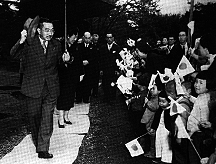 [WesMaps Home Page]
[Course Search]
[Course Search by CID]
[WesMaps Home Page]
[Course Search]
[Course Search by CID]
HIST305
From Empire to Occupation: World War II and Its Legacy in Japan
HIST305 FA
Crosslistings: EAST305
| Section | Class Size | *Available | Times |
|---|
| 1 | 15 | 0 | Times: M...... 1:10PM-4:00PM; |
*The number of spaces listed as available is based on class seats open for
the current phase of registration. Some seats may be taken in previous
phases while others may be held out for subsequent phases of registration.
(Last Updated on Wed Mar 4 05:01:03 EST 1998
)
 Photo Caption and Credits
Photo Caption and Credits
World War II remains the most important event in
twentieth-century Japanese history, in terms both of how the
Japanese view themselves and their place in the world and of
how the rest of the world views Japan. This course examines
the political, economic, military, and ideological issues
that led to the War, the way in which the war was fought,
and the events of the American Occupation that led to
Japan's postwar political and economic recovery.
MAJOR READINGS
(sample)
Barnhart, JAPAN PREPARES FOR TOTAL WAR
Harries, Meirion, SOLDERS OF THE SUN
Dower, WAR WITHOUT MERCY
Specter, EAGLE AGAINST THE SUN
Other works to be added.
EXAMINATIONS AND ASSIGNMENTS
Two short papers based on
reading assignments (6-9pp), one longer research paper
(15-18pp).
ADDITIONAL REQUIREMENTS and/or COMMENTS
Open to all but
extra reading (tba) will be helpful to those with no
background in Japanese history.
COURSE FORMAT: Seminar
REGISTRATION INFORMATION
Level: UG Credit: 1.00
Gen Ed Area & Dept: SBS HIST
Prerequisites:
None
- Section 01
- Johnston, W
- Times: M...... 1:10PM- 4:00PM;
- Grading Mode: A/F
- Registration Preference (1 high to 6 low, 0=Excluded) Sr: 1, Jr: 2, So: 3, Fr: 4
- Major Preference Given
Last Updated on MAR-03-1998
About the Photo:
Emperor Hirohito adopted a more Western style of clothes and
behavior after World War II ended.
Reference:
Nicholls, C.S., POWER: A POLITICAL HISTORY OF THE
TWENTIETH CENTURY, New York: Oxford University
Press, 1990.
Contact wesmaps@wesleyan.edu to
submit comments or suggestions.
Copyright Wesleyan University, Middletown, Connecticut, 06459
 Photo Caption and Credits
Photo Caption and Credits